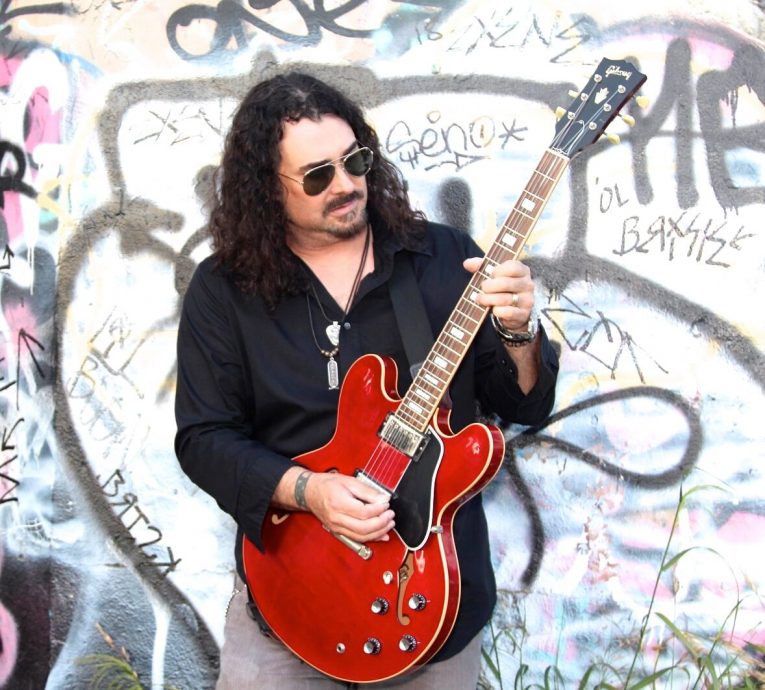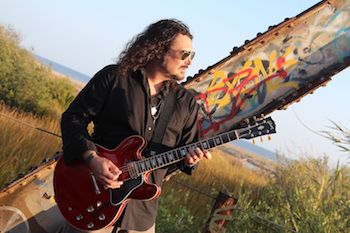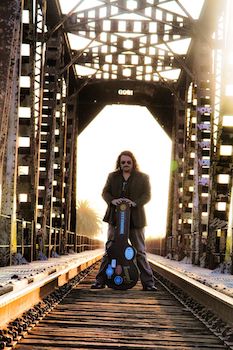
By Kevin Porter
Blues-rock guitarist, singer-songwriter, Alastair Greene has been thrilling audiences for nearly two decades and especially fans in his native Southern California. He is well known and respected for his mix of blues, rock and soul, as well as his melodic guitar solos and slide playing. He toured with and played on five albums with progressive rock legend Alan Parsons, and played on albums released by drummer Aynsley Dunbar and Blues singer, harmonica legend and former member of WAR, Mitch Kashmar, and many more. Either solo or with his band, Greene has opened for The Fabulous Thunderbirds, Robin Trower, John Mayall and The Bluesbreakers, Lonnie Brookes, Lucky Petersen, Jonny Lang, Joe Bonamassa, Walter Trout and many more.
Alastair Greene formed his own band in 1997 and has released five of his own CDs and has appeared on countless independent CD releases ranging from blues-rock to Southern rock. His Dream Train album from last year was a Rock and Blues Muse favorite, and his recently released live album, Live from the 805, is winning over critics and fans alike. Recorded to celebrate 20 years of playing music, Live from the 805 is a rocking record with exquisite guitar playing and soulful vocals from Greene, backed by his tight band. The live album was recorded so well that you feel like you are there. Alastair was kind enough to talk to us by phone from his home in California.
Kevin Porter: I’m really enjoying the live album your new album, Live At The 805 and so are our readers. How did that come about?
Alastair Greene: The very end of last year coincided with the 20th anniversary of me forming my band. I decided that it would be good to document my trip through this life playing music and to recordand celebrate that. I wanted to do about 30-some songs that night, but I had it in my head that I wanted to do 20 songs for 20 years. I’m really proud of how it came out. It was well recorded and the band played well.
KP: The recording is really good, by the way. I was really impressed by it. Sometimes live records can sound kind of tinny and this album has great sound.You picked this place because it had a good board to record on?
AG: The idea was sparked by a guy that I’ve recorded my last two studio records with – Sean McCue. He had worked with the venue before in Santa Barbara, which is where I grew up. He mentioned to me a couple of years ago that he recorded there and it came out well. When I got the idea to do a live record of my band, it was kind of a no-brainer. He brought in his laptop and patched into the mixing board at the club. Sean did a great job mixing and mastering and I think it’s a good representation. It doesn’t sound too studio perfect, and it still has the live energy and rawness. We really got the sound that I was hoping to get.
KP: You did a Jimmy Reed cover on the live album. How did that come about?
AG: I’ve always been a Jimmy Reed fan, but our particular version came about a while back. I did a series on Thursdays at a different club in Santa Barbara where I’d bring on a special guest every week and a friend of mine, a saxophone player who also sings, did a version of that. I’ve always been interested in taking covers and respectfully doing something different with them sometimes. I think as a blues-rock musician, I have a little bit of a license to do it. That’s kind of the heritage of being a blues-rock musician–that you mess with covers a little bit. Whereas if I was playing in a more traditional or Chicago-style blues band or something like that, I probably wouldn’t be messing with the covers as much.

We really try and communicate on stage more like what people are calling jam bands now. I just think of Cream and Hendrix along with the Allman Brothers and the Grateful Dead because they take advantage of using their time to communicate with their instruments.
KP: Do you think that’s coming back a little bit? I mean long jams and guitar solos. It seems to be bubbling under the surface.
AG: Well, there’s some bands that are doing it at a pretty big level. I think Gov’t Mule is technically under that umbrella. And so is a band like Moe, who is very popular, especially when you get out to the Midwest and the East Coast. I like their music. I’m a huge fan of Gov’t Mule and have been since they started. I think that’s coming back or has come back. As far as blues-rock, I haven’t seen every blues-rock trio that’s out there right now but I know that there’s a lot of guys playing long guitar solos (laughs). Whether or not they are having the whole band enter into the ring the way that jam bands do, I don’t know. That’s kind of what we do when we have those moments. Try and create some magic for the people.
KP: Tell me about your band. Is it Jim Rankin on bass and Austin Beede on drums? Have I got that right?
AG: Yep, you sure did.
KP: How long have you been playing with these guys?
AG: Well, Jim’s been in the band for coming up on 11 years and Austin’s been in the band for five or six years. He doesn’t come out on the road with us as much because he and his wife had a child so we’ve got a guy named Anthony Ambriz, who is a great young drummer as well. They are great players and I feel as if this incarnation of my band deserved to be recorded.
KP: I really like Jim’s harmony vocals with you. He sounds really good.
AG: He’s a really powerful vocalist.
KP: The Alastair Greene Band is your primary gig now, right?
AG: That’s right. But I’m going to do some shows with Sugaray Rayford. We’re going up the West coast, and then we’re going to Europe in November. I go where the energy is, and where I can be playing music that’s close to my heart and that’s why I agreed to do these shows with Sugaray. I really like the music and everyone needs to work.
KP: I understand your grandfather, Chico Alvarez, was the source of your wanting to have a music career. Is that right?
AG: Yeah. He was a big inspiration to me early on and continues to be an inspiration because you know, he did it. He played music for a living. He had a break pretty early on when he got the gig playing trumpet with Stan Kenton in the 1940s, and he was able to parlay that into a career in music. He toured off and on with Stan for about 10 years and had his own bands. He ended up in Las Vegas and did some things with the musician’s union there. The last time I saw him he was playing a gig with a jazz combo in Vegas. It really is inspiring to me because it’s about falling in love with music and taking it where it leads you.
KP: You played a song written by Billy Gibbons. How did that come about?
AG: We decided to have David Z produce that record. David Z mixed the record, Trouble at Your Door, and I basically got introduced to David by Randy Chortkoff, who was the president of Delta Groove Records. Randy has since passed away. He introduced me to David as a potential guy to have mix Trouble at Your Door so I started my relationship with David then. I always worked as a co-producer with other producers, but I’d never really brought in someone to produce. Dream Train was the first time that I’d done that. He had some demos from Billy Gibbons that he was involved in a few years ago. I listened to them and “Nome Zayne” really caught my ear, and it was not out of the realm of what my band was capable of playing. David shot off an email to the powers that be. We got Billy’s blessing and we started playing it. We since sent him the music video and the track, and word is that he really liked it, which was cool. I am a huge fan of ZZ Top and of Billy’s guitar playing and writing, so it was cool to do.
KP: Do you model your singing after anyone, or is there a vocalist that you particularly like?

AG: That’s a good question. I wasn’t born with a natural singing voice. It’s something I had to develop. I’m capable of singing and I’m comfortable singing the music that I write. I also try to find covers that are in a key that is comfortable for my voice. I got a lot of inspiration from other white guys that were fans of blues artists like Eric Clapton and Stevie Ray Vaughn. You listen to the great blues singers, which I am never going to be in the ball park of. You listen to BB King, Magic Sam, or even Freddie King and Bobby Blue Bland–you soak it up even though I know I’m never going to sound like that because your voice is such a personal thing. You draw inspiration from those artists to develop your voice. Everyone has a distinct voice. I listen to a lot of singers and I try to sing a lot of stuff and keep it moving forward, just as I do with my guitar playing.
KP: That actually ties nicely into my next question. You mentioned a lot of folks, Cream and ZZ Top, BB King and Freddie King – I assume those are all musiciansthat inspired you. Are there other musicians whoinspired your guitar playing and any albums in particular?
AG: Yeah, well, that’s a long list. It changes all the time. I was a hard rock kid growing up and when I first started playing the guitar, it was Van Halen and Ozzy. I had a guitar instructor at the time who had the foresight to give me a tape of Cream and Hendrix and Freddie King and some Ventures and told me, if you’re really going to play rock, you got to get into this stuff. I got into blues when I was about 17. Of course, Stevie Ray Vaughn was a huge inspiration, and he’d talk in interviews about his inspirations, and that’s when I’d start getting an education in the blues. He’d talk about Hubert Sumlin, Buddy Guy and Albert Collins and I had the wherewithal to go and get the records.
As far as records with guitar playing that I really got into – BB King Live at the Regal, Buddy Guy, Allman Brothers At Fillmore East. I’m a fan of Eric Johnson. I like Steve Morse, Jeff Beck – he was originally inspired by blues but now he’s living on a different planet. I was inspired by that. I like Gary Moore. Another guy that I resonated with, he’s been gone for some time, was Rory Gallagher. I got turned onto him while he was still alive. Unfortunately, I never got a chance to see him. You start talking about Albert Collins and how original he sounds on the guitar. No one sounds like that. I really love his music. Magic Sam, I really love the way he plays too.
KP: I take it you’re kind of a Les Paul guy when it comes to playing guitars.
AG: I’ve gone back and forth between a few different guitars in my life. I originally was a Strat guy, and I started playing a Les Paul because I wanted to find my own voice. I still consider myself a Les Paul guy, but I still play my Strat on occasion. That’s a Strat on the cover of the live album. My favorite guitar is my Gibson 335 because of the sound and the quality. There really is nothing like that instrument. But as far as something that can be something on the rock side, the Les Paul is great. It’s hard for me to pick. I’m not one of those guys like Rory Gallagher. You know, every picture of him he’s playing the same guitar and he pretty much did his entire career. Me, I switch around every 5-6 years. I think for the first couple of years I played with Alan Parsons, I played a Fender Eric Clapton model Stratocaster. A couple years in, I ended up switching to this Les Paul standard that I found used that I really like and now I find myself playing my Strat more. So, it’s hard to answer that question. (Laughter)
KP: When you write songs, what’s your approach? Do you write the music first? Do you write the lyrics first? What’s your philosophy?
AG: You know, it kind of depends. I’ll play guitar and have an idea for a riff, and I’ll just record the music at home. For lyrics, usually a line or two will come to me out of nowhere, and it’ll mean nothing. I’ll be like, that rhymes, great, and I’ll take it and try to build a story around it because you can always find a couple of good lines. It’s like you’re putting together a puzzle—you have a few pieces put together but you don’t know what’s it’s going to be. I want to be able to keep developing my songwriting because that’s really, at the end of the day, what will resonate beyond the guitar geeks.
KP: When it comes time to make an album do you sit down and write a bunch of songs or do you do this incrementally as you go along?
AG: I kind of catalogue stuff. If I come up with stuff, I’ll record it so I have a library of ideas, but when it’s time to make a record I go, let’s get into that mode and I try to get together the ideas I already have saved up and see if there are any that are floating my boat. Then I try to put together enough songs to come up with a record.
KP: I know you just came out with a live record. Are you thinking of doing a studio record down the road?
AG: Yeah, I already started conceptualizing that. I can’t give too much away now because certain things haven’t come to light yet. But I already know the direction. I’m always thinking of the next record or even two as far as just the concepts. Do I want it to rock, do I want it to be more in the blues end of things? The last couple of records have been pretty rocking and you want to change that up. When people start getting used to you and your music, you don’t want to jar them too much, but as an artist, you want to continue to stretch yourself.
KP: I know you tour a lot. What can fans expect from an Alastair Greene concert?
AG: I try to stick to the original songs and play those. I try to get a feel for the room. I don’t necessarily want to bash people over the heads with stuff. If it’s a real blues crowd, I won’t do as much of the rocking materials because I know it isn’t necessarily going to connect. If it’s outdoors and we can kind of crank and let something go, then we do that. I try to be fresh and be true to the place that we’re in. If we’re playing a small place, you don’t want to blast everyone out. It kind of depends.
KP: Do you go in with a pre-determined set list or do you go in with a few songs and then take it from there?
AG: That’s a good question. It depends on the gig. If it’s a club gig or a bar gig where you’re playing 2 ½ – 3 hours, I won’t have a set list, I’ll just feel it out and see how it goes. If we’re playing a festival or we’re opening up for someone, I’ll usually have a set list because we want to hit the marks. I always put on the bottom of my set list some audibles and I’ll list a few songs there just in the event I want to change something. It alldepends on the gig.
KP: Do you have any timing for your next record? Is it next summer or can yoube that specific?
AG: I think in a perfect world, next summer would be good. There’re some things right now that are formulating so I can’t really say with any certainty what’s going to happen. I would love it if I could get one out next summer.
For more information on Alastair Greene and Live at The 805:
Website https://agsongs.com
Facebook https://www.facebook.com/AlastairGreeneOfficial

Leave A Comment